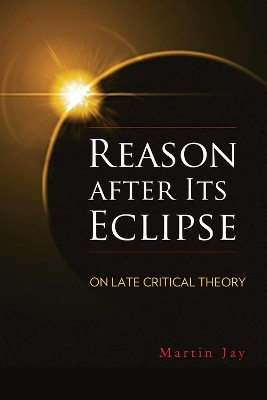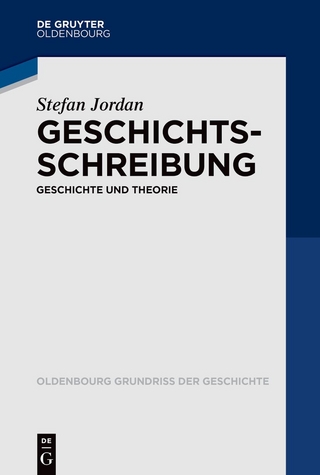
Reason after Its Eclipse
On Late Critical Theory
Seiten
2016
University of Wisconsin Press (Verlag)
978-0-299-30650-2 (ISBN)
University of Wisconsin Press (Verlag)
978-0-299-30650-2 (ISBN)
Tackles a question as old as Plato and still pressing today: what is reason, and what roles does and should it have in human endeavour? Applying the tools of intellectual history, Martin Jay examines the overlapping, but not fully compatible, meanings that have accrued to the term “reason” over two millennia, homing in on moments of crisis, critique, and defense of reason.
Martin Jay tackles a question as old as Plato and still pressing today: what is reason, and what roles does and should it have in human endeavor? Applying the tools of intellectual history, he examines the overlapping, but not fully compatible, meanings that have accrued to the term “reason” over two millennia, homing in on moments of crisis, critique, and defense of reason.
After surveying Western ideas of reason from the ancient Greeks through Kant, Hegel, and Marx, Jay engages at length with the ways leading theorists of the Frankfurt School—Horkheimer, Marcuse, Adorno, and most extensively Habermas—sought to salvage a viable concept of reason after its apparent eclipse. They despaired, in particular, over the decay in the modern world of reason into mere instrumental rationality. When reason becomes a technical tool of calculation separated from the values and norms central to daily life, then choices become grounded not in careful thought but in emotion and will—a mode of thinking embraced by fascist movements in the twentieth century.
Is there a more robust idea of reason that can be defended as at once a philosophical concept, a ground of critique, and a norm for human emancipation? Jay explores at length the communicative rationality advocated by Habermas and considers the range of arguments, both pro and con, that have greeted his work.
Martin Jay tackles a question as old as Plato and still pressing today: what is reason, and what roles does and should it have in human endeavor? Applying the tools of intellectual history, he examines the overlapping, but not fully compatible, meanings that have accrued to the term “reason” over two millennia, homing in on moments of crisis, critique, and defense of reason.
After surveying Western ideas of reason from the ancient Greeks through Kant, Hegel, and Marx, Jay engages at length with the ways leading theorists of the Frankfurt School—Horkheimer, Marcuse, Adorno, and most extensively Habermas—sought to salvage a viable concept of reason after its apparent eclipse. They despaired, in particular, over the decay in the modern world of reason into mere instrumental rationality. When reason becomes a technical tool of calculation separated from the values and norms central to daily life, then choices become grounded not in careful thought but in emotion and will—a mode of thinking embraced by fascist movements in the twentieth century.
Is there a more robust idea of reason that can be defended as at once a philosophical concept, a ground of critique, and a norm for human emancipation? Jay explores at length the communicative rationality advocated by Habermas and considers the range of arguments, both pro and con, that have greeted his work.
Martin Jay is the Sidney Hellman Ehrman Professor of History at the University of California, Berkeley. He is the author of fourteen previous books, including The Dialectical Imagination: A History of the Frankfurt School and the Institute of Social Research, 1923–50, which has been translated into thirteen languages; Marxism and Totality: The Adventures of a Concept from Lukács to Habermas; Adorno; Permanent Exiles: Essays on the Intellectual Migration from Germany to America; Downcast Eyes: The Denigration of Vision in Twentieth- Century French Thought; Songs of Experience: Modern European and American Variations on a Universal Theme; and The Virtues of Mendacity: On Lying in Politics.
| Erscheint lt. Verlag | 21.4.2016 |
|---|---|
| Reihe/Serie | George L. Mosse Series in the History of European Culture, Sexuality, and Ideas |
| Verlagsort | Wisconsin |
| Sprache | englisch |
| Maße | 152 x 231 mm |
| Gewicht | 524 g |
| Themenwelt | Geisteswissenschaften ► Geschichte ► Geschichtstheorie / Historik |
| Geisteswissenschaften ► Geschichte ► Regional- / Ländergeschichte | |
| Geisteswissenschaften ► Philosophie ► Philosophie der Neuzeit | |
| Sozialwissenschaften | |
| ISBN-10 | 0-299-30650-X / 029930650X |
| ISBN-13 | 978-0-299-30650-2 / 9780299306502 |
| Zustand | Neuware |
| Haben Sie eine Frage zum Produkt? |
Mehr entdecken
aus dem Bereich
aus dem Bereich
Russland, die Ukraine und der Westen
Buch | Softcover (2024)
De Gruyter (Verlag)
CHF 55,90
Geschichte und Theorie
Buch | Softcover (2024)
De Gruyter Oldenbourg (Verlag)
CHF 34,90
wie Irritationen historisches Denken anregen
Buch | Softcover (2024)
Kohlhammer (Verlag)
CHF 96,55


